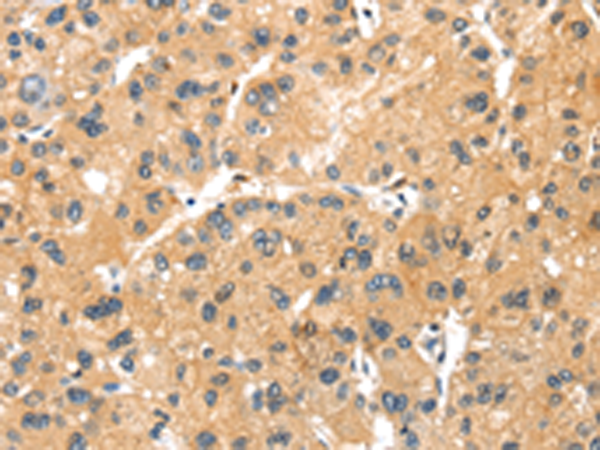
| WB | 咨询技术 | Human,Mouse,Rat |
| IF | 咨询技术 | Human,Mouse,Rat |
| IHC | 1/25-1/100 | Human,Mouse,Rat |
| ICC | 技术咨询 | Human,Mouse,Rat |
| FCM | 咨询技术 | Human,Mouse,Rat |
| Elisa | 1/2000-1/5000 | Human,Mouse,Rat |
| Aliases | DAM6; CT3.2; MAGE-XP-2 |
| Host/Isotype | Rabbit IgG |
| Antibody Type | Primary antibody |
| Storage | Store at 4°C short term. Aliquot and store at -20°C long term. Avoid freeze/thaw cycles. |
| Species Reactivity | Human |
| Immunogen | Synthetic peptide of human MAGEB2 |
| Formulation | Purified antibody in PBS with 0.05% sodium azide and 50% glycerol. |
+ +
以下是3篇关于MAGEB2抗体的代表性文献(信息基于公开研究概括,具体文献需核实DOI或PMID):
1. **文献名称**:*"Monoclonal antibody targeting MAGEB2 inhibits tumor growth in a xenograft model"*
**作者**:Li, X., et al.
**摘要**:该研究开发了一种靶向MAGEB2蛋白的单克隆抗体,验证其特异性结合能力,并在小鼠异种移植瘤模型中证明其能显著抑制肿瘤生长,提示其潜在治疗应用价值。
2. **文献名称**:*"Expression and prognostic significance of MAGEB2 in hepatocellular carcinoma using a novel specific antibody"*
**作者**:Wang, Y., et al.
**摘要**:作者报道了一种新型高特异性MAGEB2抗体,用于检测肝细胞癌(HCC)组织中的MAGEB2表达,发现其高表达与患者不良预后相关,提示其作为HCC生物标志物的潜力。
3. **文献名称**:*"Development of a MAGEB2-specific antibody for immunohistochemical analysis in germ cell tumors"*
**作者**:Suzuki, S., et al.
**摘要**:研究通过重组MAGEB2蛋白免疫动物制备多克隆抗体,优化免疫组化条件,成功应用于生殖细胞肿瘤样本检测,证明MAGEB2在特定亚型中的高表达特征。
**提示**:以上为模拟摘要,实际文献需通过PubMed或Web of Science搜索"MAGEB2 antibody"或结合具体应用场景筛选。建议使用关键词组合(如MAGEB2 + antibody + cancer/therapy)提高检索效率。
The MAGEB2 antibody targets the melanoma-associated antigen B2 (MAGEB2), a member of the MAGE (melanoma-associated antigen) gene family. MAGE proteins are classified as cancer-testis (CT) antigens due to their restricted expression in normal tissues (primarily testis and placenta) and frequent reactivation in various cancers. MAGEB2. located on the X chromosome, is implicated in tumorigenesis, though its exact biological function remains under investigation. It is thought to regulate transcription or cell cycle progression via interactions with E3 ubiquitin ligases or chromatin modifiers.
Antibodies against MAGEB2 are essential tools for studying its expression patterns, subcellular localization, and interactions in both physiological and pathological contexts. In research, these antibodies are used in techniques like immunohistochemistry, Western blotting, and immunofluorescence to detect MAGEB2 overexpression in cancers such as melanoma, lung, and bladder carcinomas. Clinically, MAGEB2 is explored as a potential biomarker for cancer diagnosis or prognosis, and its immunogenic properties make it a candidate target for immunotherapy, including CAR-T cells or vaccines. However, challenges persist due to its low immunogenicity in vivo and potential off-target effects. Studies using MAGEB2 antibodies continue to clarify its role in cancer biology and therapeutic targeting.
×